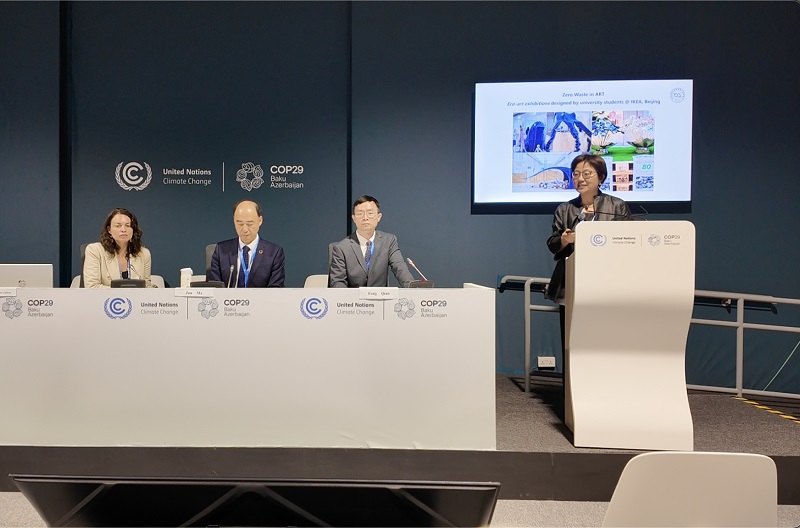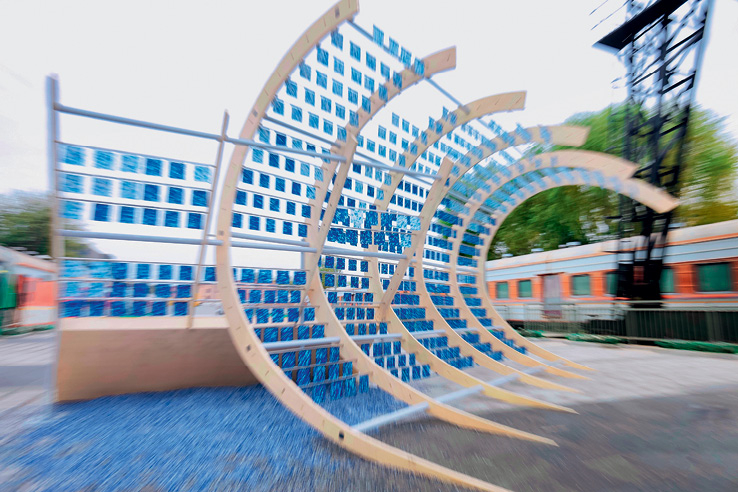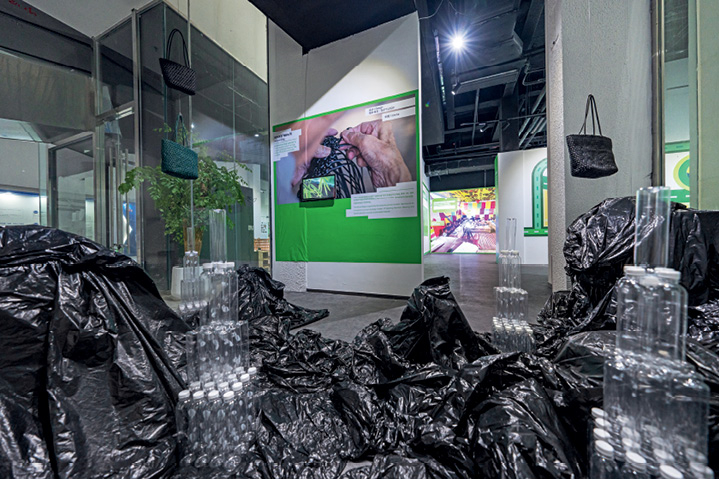
Products made by BOTTLOOP from recycled materials in China’s iconic Palace Museum, also known as the Forbidden City.
In a gift store in China’s iconic Palace Museum, also known as the Forbidden City, sustainable cultural and creative products made from recycled materials are a hit with visitors. One of the products, a dragon-patterned cellphone bag, went viral on China’s popular social media platform Weibo, and people couldn’t believe that the delicate “leather” pouch was actually made of apple peel.

Liu Xuesong, founder of Baopu Regeneration or BOTTLOOP, attends a side event during the 29th meeting of the Conference of the Parties to the United Nations Framework Convention on Climate Change in Baku, Azerbaijan, in November 2024.
Making an Apple-Peel Bag
“Last year was the Year of the Dragon, which is a unique and important symbol in Chinese culture. Therefore, we selected the image of the dragon from one of the exhibits in the Palace Museum,” said Liu Xuesong, founder of Baopu Regeneration or BOTTLOOP, a brand that makes eco-friendly products with organic and recycled materials, such as plastic bottles.
It created the pouch inspired by an antique vase with a red-and-gold dragon flying among clouds painted on it in the museum’s collection, made during Qing Emperor Kangxi (1654-1722)’s reign.
“This vase has a very high artistic value. The unique shape of the dragon on porcelain reflects the technological skills and the aesthetics during that time,” Liu said. When visitors buy the souvenir based on it, they take home some of the cultural essence of the Palace Museum.
BOTTLOOP, as the name suggests, denotes the circulation of bottles. Baopu is a typical cultural word taken from Chinese philosopher Laozi’s book Tao Te Ching. It means embracing simplicity. Laozi wrote: “Value the ordinary; embrace the simple. Minimize the self; turn away from covetousness.” This is also the philosophy of BOTTLOOP – advocating an eco-friendly lifestyle that returns to the origin, embraces simplicity, and regenerates.
Liu, who worked in the fashion and lifestyle industry for 15 years in Japan, is now with INCOM Recycle, a Beijing-based enterprise that makes and operates intelligent recycling plants. It can annually process 50,000 tons of plastic bottles, a capacity that helped Liu create Baopu Regeneration in 2019, a trendy brand integrating Chinese philosophy on environmental protection with popular youth culture.
The cellphone pouch, she explains, is of vegan leather, a bio-based material made of pomace, the solid remains of fruits used to make juices, and waste from the candied fruit industry. It is an innovative substitute for animal leather, and the whole production process is eco-friendly. “Under certain conditions, it can degrade,” she said.

An artwork by BOTTLOOP at the 751 International Design Festival, in which the panels and granular materials are recycled plastic.
Zero Waste Museum
BOTTLOOP is a partner of the “Zero Waste Museum,” an initiative launched in 2020 by the Palace Museum and Vanke Foundation, a non-profit fund-raising organization. It is part of the efforts by the Palace Museum to encourage waste reduction, sorting, and recycling, starting with managing the waste generated in its offices and historical sites.
For example, since 2020, the Palace Museum has implemented the “Zero Waste Office” initiative among its staff and advocated the “Zero Waste Tour” for visitors. The number of garbage bins in the museum has been reduced from 310 to 110. This preserves the aesthetics of the heritage site while encouraging visitors to develop the habit of reducing waste production. The target is to minimize the generation of waste that needs to be buried or burned, bringing it as close to zero as possible.
In the “Zero Waste Souvenir” project, the apple-peel cellphone pouches stand out. The “Songfu bracelet,” woven with fallen leaves, is another popular item among visitors, as well as eye masks, rain ponchos, handbags, and silk scarves made from recycled plastic bottles. “People are inspired with greater imagination, realizing that waste can also be transformed into fashion items, which helps to reduce carbon and plastics,” Liu said.
BOTTLOOP’s products carry the carbon reduction data. The vegan leather pouch, for example, reduces carbon emissions by 78 gram per piece. In the “Zero Waste Museum” project, designers use creative labels to let consumers know how the products are recycled and created.
According to the Palace Museum website, from June 2021 to January 2024, the museum recycled more than 60,000 plastic bottles to make cultural and creative products, equivalent to reducing over 1,700 kilograms of carbon emissions.
“Through cross-sectoral cooperation with fashion, art, public welfare and other fields, we hope to provide our partners with creative zero-waste solutions, and introduce renewable creative products to young consumers, so that the concept of sustainable living can take root in people’s hearts,” Liu said.
She describes it as a “co-creation” relationship, which invites the museum staff, tourist guides, and visitors to participate, amplifying the value of circular economy.

Daoming bamboo weaving, an intangible cultural heritage art, is used to make these items from recycled plastic. They were on display at the 2024 Social Design Exhibition in the Red Dot Design Museum Xiamen from July 13 to September 21, 2024.
Eco-Friendly Fashionistas
Liu believes that creative products should meet young people’s need to have more social contacts.
In 2018, BOTTLOOP made their first T-shirt from eight recycled bottles. The tees have a QR code which, on being scanned, gives information on their carbon footprint. Liu said young buyers were willing to share the information and encouraged each other to follow a greener lifestyle.
During the 2018 FIFA World Cup in Russia, the organizers, who wanted to showcase a green game, asked 450 young volunteers to wear the eco-friendly T-shirt. “They wanted to ensure that the tournament delivered an outstanding sustainability performance, which was a big move for FIFA and for the world of sports. So they called us to be a partner in organizing this mega-event in a sustainable manner,” Liu said. One year later, BOTTLOOP’s T-shirts and bags also appeared on the streets of New York during the 2019 United Nations Youth Climate Summit.
In 2018, “Beat Plastic Pollution” was the theme of World Environment Day. That year, Liu was invited to attend a forum on beating plastic pollution at the UN headquarters in New York, where she spoke about INCOM Recycle and BOTTLOOP’s practices in this field, as a Chinese solution for the global plastic crisis.
“I never thought I would have the opportunity to speak at the United Nations and share my story, but everyone thought the initiative was good!” Liu said.
In November 2024, she attended a side event during the 29th meeting of the Conference of the Parties to the United Nations Framework Convention on Climate Change in Baku, Azerbaijan. The theme was “people-oriented circular economy transformation,” and she spoke about China’s recycling practices to ensure zero waste.
Plastics, Liu says, is one of the dirtiest industries. Yet she has been in it for a decade now. There are two prime reasons. She studied sociology and feels strongly about serving society. Also, she is a mother. “The earth is not a legacy passed down by our ancestors, but something we have borrowed from future generations,” that is how she explains her philosophy. “To show our love for our children, we should leave them a beautiful earth with a sustainable environment. Therefore, I turn plastic waste into recycled materials, and combine fashion design and modern technology to make eco-friendly products. In doing so I want to connect more people who care about the earth.”